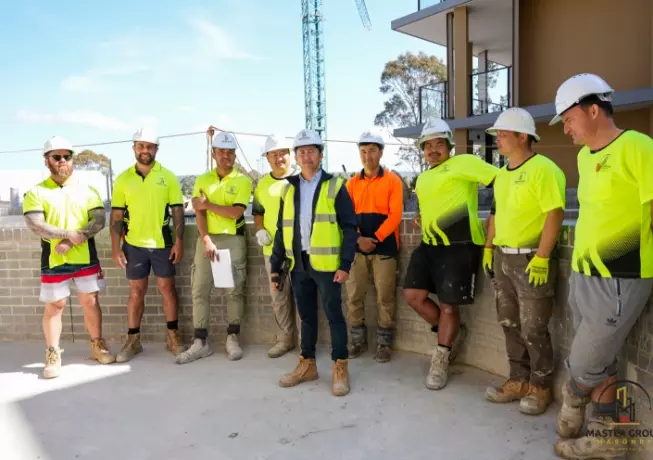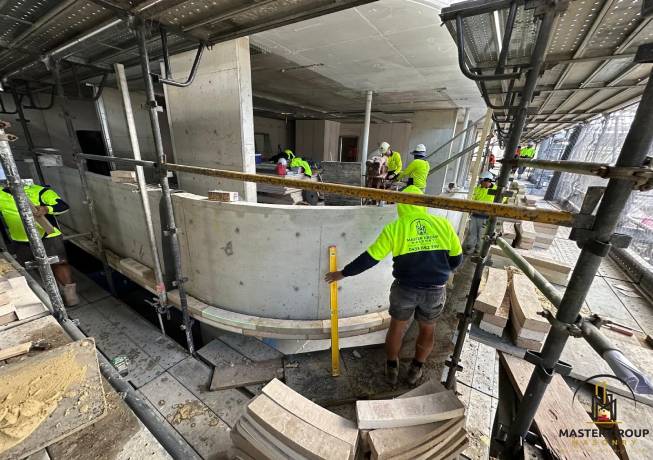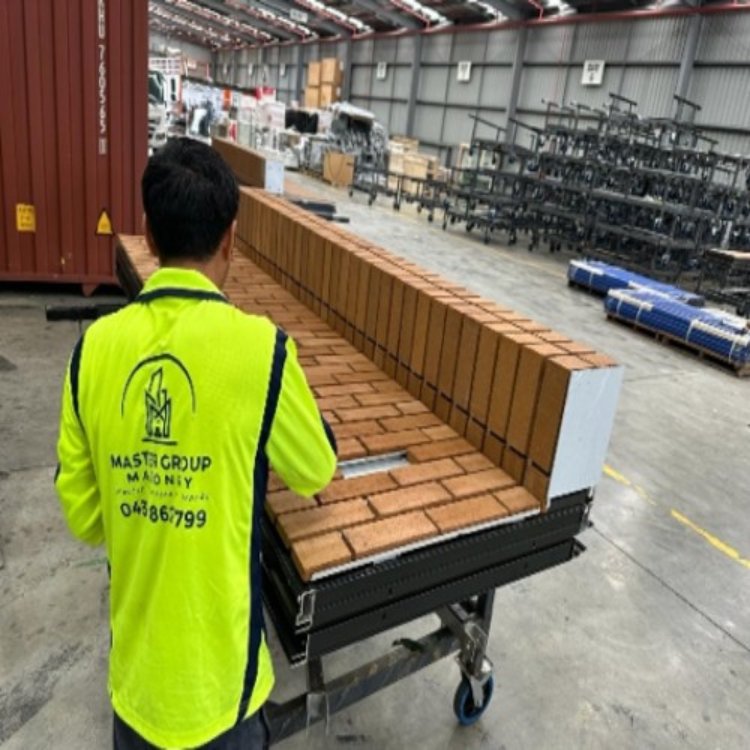General Frequently Asked Questions (FAQ)
Home /
Find answers to frequently asked questions about Master Group Masonry, covering services, processes, and solutions for all your masonry needs. Get expert insights in our comprehensive FAQ section.
Master Group Masonry ( FAQ )
1. What types of bricklaying services does Master Group Masonry offer in Sydney?
Master Group Masonry provides a wide range of bricklaying services, including the construction of brick walls, fences, and feature walls. We specialize in both residential and commercial projects, ensuring precision and quality in every job.
2. Why should I hire professional bricklayers from Master Group Masonry?
Hiring our skilled bricklayers ensures that your project is handled with expertise and attention to detail. Our team adheres to safety standards and delivers craftsmanship that enhances the durability and aesthetic appeal of your structure.
3. What is brick cladding, and how can it benefit my property?
Brick cladding involves applying a layer of brick tiles or materials to the exterior of a building, improving both its look and structural integrity. It provides a stylish finish while protecting your property from the elements.
4. Can Master Group Masonry handle large-scale commercial projects?
Yes, our team is highly experienced in managing large-scale commercial bricklaying projects. We have successfully completed various complex projects across Sydney, delivering structures that are both safe and visually impressive.
5. What materials do you use for block laying and retaining wall construction?
We use a variety of high-quality materials, including concrete blocks, retaining wall blocks, and bricks. These materials are selected based on the specific needs of your project to ensure longevity and strength.
6. How can retaining wall blocks enhance my landscape?
Retaining wall blocks not only prevent soil erosion but also add visual interest and functionality to your landscape. They can create terraces, manage slopes, and integrate with other hardscaping elements like pavers.
7. Is bricklaying suitable for both residential and commercial projects?
Absolutely. Our bricklaying services cater to both residential homes and commercial buildings, providing solutions that range from aesthetic enhancements to structural necessities.
8. What are the benefits of choosing Master Group Masonry for my construction project?
By choosing us, you benefit from our expertise in masonry, attention to detail, use of premium materials, and commitment to your vision. We ensure that your project is completed to the highest standards, on time, and within budget.
9. How can I get a quote or consultation for my bricklaying project?
You can easily request a quote or consultation by calling us at 0435 862 799 or emailing admin@mastergroupbc.com.au. Our team is ready to discuss your project and provide expert advice tailored to your needs.
10. What is the process of brick slip façade installation, and where have you used it?
The brick slip façade system involves installing thin brick tiles on the exterior of a building, offering the look of traditional brickwork with reduced weight and space requirements. We have successfully implemented this system in projects like Scape Kensington, ensuring efficiency and aesthetic appeal.
11. What is a masonry block?
Masonry blocks are essential construction materials used to create walls and structures by placing them one on top of another, bonded by mortar. These blocks are highly valued for their durability, fire resistance, and acoustic insulation, making them a key component in building strong and lasting structures.
12. Is masonry the same as concrete blocks?
Masonry refers to the construction process involving blocks, stones, or bricks, while concrete blocks are specific types of masonry units made from concrete. While all concrete blocks are masonry units, not all masonry units are concrete blocks.
13. Is masonry the same as concrete?
No, masonry and concrete are different. Masonry is a construction technique that uses blocks, while concrete is a material used to create various parts of a structure, including concrete blocks. Masonry involves construction with stones or blocks, whereas concrete consists of cement, water, and aggregates combined into a solid mass upon hardening.
Technical Frequently Asked Questions (FAQs) on Masonry Materials, Installation, and Costs
1. What are the most widely used masonry materials?
Clay Bricks
Description: Traditional and durable, fired clay bricks are available in various colors and textures. They assist with temperature control in homes.
Uses
- Residential exteriors: Common for house walls.
- Commercial buildings: Often used for facades.
Advantages
- Durable: Long-lasting and weather-resistant.
- Insulating: Good thermal performance.
- Variety: Many color and style options.
Concrete blocks
Description: Made from cement, sand, and aggregates, concrete blocks are large, strong, and versatile.
Uses
- Structural walls: Ideal for foundations and load-bearing walls.
- Partitions: Used for interior walls and garden walls.
Advantages
- Strong: High load-bearing capacity.
- Versatile: Can be used in various applications.
- Cost-effective: Generally less expensive than clay bricks.
Brick Slips (Brick Veneers)
Description: Thin slices of clay bricks applied to walls, giving the appearance of full brickwork without the thickness.
Uses
- Decorative walls: For both interior and exterior finishes.
- Renovations: Ideal for updating existing structures.
Advantages
- Aesthetic appeal: Mimics traditional brick looks.
- Flexible: Can be applied to different surfaces.
- Easy installation: Lighter and simpler to install than full bricks.



2. What is the difference between bricks and blocks?
- Size and Shape:
- Bricks: Smaller, generally measuring 190 mm x 90 mm x 57 mm (7.5 in x 3.5 in x 2.25 in).
- Blocks: Larger, commonly 390 mm x 190 mm x 190 mm (15.4 in x 7.5 in x 7.5 in).
- Composition:
- Bricks: Made from natural clay, fired in a kiln.
- Blocks: Typically made from concrete, often cured rather than fired.
- Uses:
- Bricks: Commonly used for aesthetic purposes in residential and commercial buildings.
- Blocks: Primarily used for structural purposes such as walls, foundations, and partitions.
- Installation:
- Bricks: Require detailed workmanship due to their smaller size.
- Blocks: Quicker to lay due to their larger size.
- Aesthetic and Insulation:
- Bricks: Provide a classic look and good thermal insulation.
- Blocks: More utilitarian appearance but can be finished with coatings for aesthetics
3. What are brick slips used for?
- Decorative Wall Finishes: For creating stylish interiors and enhancing curb appeal.
- Renovations: Ideal for updating old structures.
- Feature Walls: Used in homes and commercial spaces to add texture and interest.
- Facades and Cladding: Applied to building exteriors for a brick-like appearance.
- Commercial Spaces: Used in cafes, restaurants, and shops for a branded look.
- Quick Aesthetic Solution: Lightweight and easy to install, making them cost-effective.
- Restoration Projects: Useful for historical building restoration.
4. How long does masonry last?
- Clay Bricks: Typically lasts over 50 years, often exceeding 100 years with proper maintenance.
- Concrete Blocks: Lasts 50 to 100 years, depending on quality.
- Brick Slips: Usually lasts 20 to 50 years, depending on installation quality.
5. How much does it cost to install masonry?
Costs depend on the type of material, project complexity, and location. Brickwork tends to cost more due to the labor involved.
6. Can I install brick slips myself, or should I hire a professional?
While DIY installation is possible, it is recommended to hire a professional to ensure proper alignment and adhesion.
7. What factors affect the cost of masonry work?
- Project Complexity: Intricate designs require more skilled labor.
- Size and Scope: Larger projects require more labor hours.
- Site Conditions: Difficult site access can increase labor costs.
- Local Labor Rates: Labor costs vary by region.
- Material Choice: Handling different materials can affect labor costs.
- Permit and Inspection Requirements: Necessary permits and inspections can add to costs.
